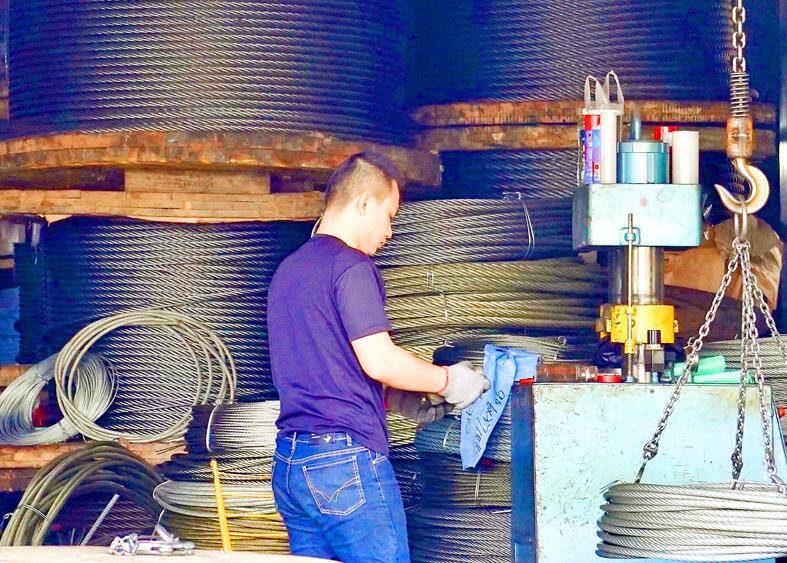The nation’s industrial production index last month shrank 3.56 percent from a year earlier, after last month falling 4.8 percent, as surging inflation and tightening monetary policy dampened consumer electronics demand, the Ministry of Economic Affairs said yesterday.
The manufacturing production index, a major contributor to industrial production, last month contracted 3.4 percent from a year earlier and is expected to extend its downward trend at an annual rate of 5.9 to 8.8 percent this month, or a monthly rate of 0.7 to 3.7 percent, the ministry told a news conference in Taipei.
However, the ministry still predicts the nation’s manufacturing sector to register annual growth for the whole of this year, it said.

Photo: CNA
“There is a slim chance for the manufacturing sector to dip into negative territory for the full year,” Department of Statistics Deputy Director-General Huang Wei-jie (黃偉傑) said. “The manufacturing production index should still gain about 1.6 percent, or 1.9 percent year-on-year in the first 11 months of this year, factoring in our estimates for this month,” Huang said.
Unless the manufacturing production index tumbles more than 10 percent year-on-year next month, an annual fall rarely observed, the index would stay above last year’s figure, he said.
However, the ministry does not hold an upbeat outlook for the sector for the first half of next year, saying that the semiconductor industry seems to be losing steam as the dedicated subindex posted two monthly declines in a row.
Being a major part of the local manufacturing sector, chipmakers usually help buoy slumps in other sectors, especially the traditional industries, the ministry said, adding that global economic uncertainties would continue to weigh on the traditional industries.
“We are more concerned about the outlook for next year because of the weaker semiconductor sector. Some semiconductor companies told us that they have adjusted capacity utilization to cope with slumping demand for chips used in smartphones and other devices,” Huang said.
“The manufacturing sector is likely to face headwinds in the first half of next year before the industry’s inventory correction period ends. We will be closely monitoring the development in the next two months,” he said.
The electronic component subindex last year rose 2.09 percent year-on-year, but was down 0.98 percent monthly. The semiconductors production subindex expanded 14.28 percent year-on-year due to robust demand for 12-inch wafers, but dropped 1.45 percent on a monthly basis.
The flat-panel display segment posted the deepest slump with an annual rate of 53.64 percent, but it rebounded 2.47 percent from a month earlier, snapping six months of declines.
Flat-panel display makers have seen new orders trickling in, thanks to robust demand to build up inventory ahead of the year-end holiday shopping season, Christmas, and the FIFA World Cup, the ministry said.
The production of computers and optical components expanded 13.53 percent year-on-year on the back of robust demand for cloud-based servers, networking devices and computer-related components.

Among the rows of vibrators, rubber torsos and leather harnesses at a Chinese sex toys exhibition in Shanghai this weekend, the beginnings of an artificial intelligence (AI)-driven shift in the industry quietly pulsed. China manufactures about 70 percent of the world’s sex toys, most of it the “hardware” on display at the fair — whether that be technicolor tentacled dildos or hyper-realistic personalized silicone dolls. Yet smart toys have been rising in popularity for some time. Many major European and US brands already offer tech-enhanced products that can enable long-distance love, monitor well-being and even bring people one step closer to

Malaysia’s leader yesterday announced plans to build a massive semiconductor design park, aiming to boost the Southeast Asian nation’s role in the global chip industry. A prominent player in the semiconductor industry for decades, Malaysia accounts for an estimated 13 percent of global back-end manufacturing, according to German tech giant Bosch. Now it wants to go beyond production and emerge as a chip design powerhouse too, Malaysian Prime Minister Anwar Ibrahim said. “I am pleased to announce the largest IC (integrated circuit) Design Park in Southeast Asia, that will house world-class anchor tenants and collaborate with global companies such as Arm [Holdings PLC],”

Sales in the retail, and food and beverage sectors last month continued to rise, increasing 0.7 percent and 13.6 percent respectively from a year earlier, setting record highs for the month of March, the Ministry of Economic Affairs said yesterday. Sales in the wholesale sector also grew last month by 4.6 annually, mainly due to the business opportunities for emerging applications related to artificial intelligence (AI) and high-performance computing technologies, the ministry said in a report. The ministry forecast that retail, and food and beverage sales this month would retain their growth momentum as the former would benefit from Tomb Sweeping Day

Thousands of parents in Singapore are furious after a Cordlife Group Ltd (康盛人生集團), a major operator of cord blood banks in Asia, irreparably damaged their children’s samples through improper handling, with some now pursuing legal action. The ongoing case, one of the worst to hit the largely untested industry, has renewed concerns over companies marketing themselves to anxious parents with mostly unproven assurances. This has implications across the region, given Cordlife’s operations in Hong Kong, Macau, Indonesia, the Philippines and India. The parents paid for years to have their infants’ cord blood stored, with the understanding that the stem cells they contained